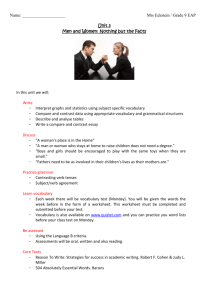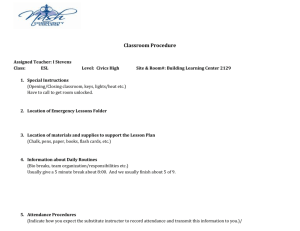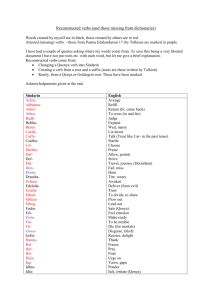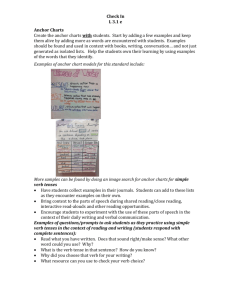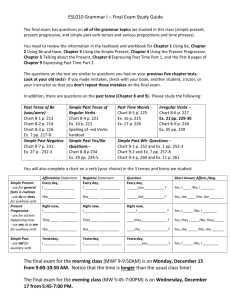3rd Grade. Unit 5. Part 2
advertisement
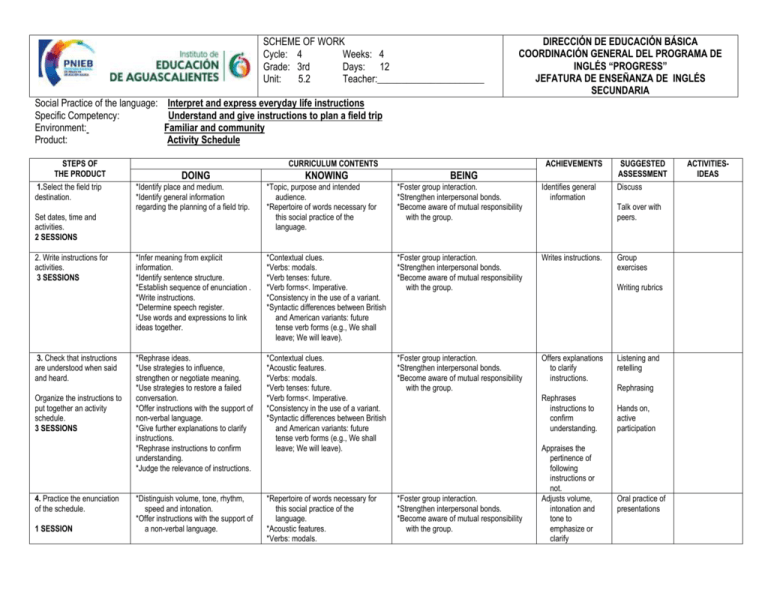
SCHEME OF WORK Cycle: 4 Weeks: 4 Grade: 3rd Days: 12 Unit: 5.2 Teacher:______________________ Social Practice of the language: Specific Competency: Environment: Product: STEPS OF THE PRODUCT 1.Select the field trip destination. Interpret and express everyday life instructions Understand and give instructions to plan a field trip Familiar and community Activity Schedule CURRICULUM CONTENTS DOING 3. Check that instructions are understood when said and heard. Organize the instructions to put together an activity schedule. 3 SESSIONS 4. Practice the enunciation of the schedule. 1 SESSION KNOWING ACHIEVEMENTS BEING *Identify place and medium. *Identify general information regarding the planning of a field trip. *Topic, purpose and intended audience. *Repertoire of words necessary for this social practice of the language. *Foster group interaction. *Strengthen interpersonal bonds. *Become aware of mutual responsibility with the group. Identifies general information *Infer meaning from explicit information. *Identify sentence structure. *Establish sequence of enunciation . *Write instructions. *Determine speech register. *Use words and expressions to link ideas together. *Contextual clues. *Verbs: modals. *Verb tenses: future. *Verb forms<. Imperative. *Consistency in the use of a variant. *Syntactic differences between British and American variants: future tense verb forms (e.g., We shall leave; We will leave). *Foster group interaction. *Strengthen interpersonal bonds. *Become aware of mutual responsibility with the group. Writes instructions. *Rephrase ideas. *Use strategies to influence, strengthen or negotiate meaning. *Use strategies to restore a failed conversation. *Offer instructions with the support of non-verbal language. *Give further explanations to clarify instructions. *Rephrase instructions to confirm understanding. *Judge the relevance of instructions. *Contextual clues. *Acoustic features. *Verbs: modals. *Verb tenses: future. *Verb forms<. Imperative. *Consistency in the use of a variant. *Syntactic differences between British and American variants: future tense verb forms (e.g., We shall leave; We will leave). *Foster group interaction. *Strengthen interpersonal bonds. *Become aware of mutual responsibility with the group. Offers explanations to clarify instructions. *Distinguish volume, tone, rhythm, speed and intonation. *Offer instructions with the support of a non-verbal language. *Repertoire of words necessary for this social practice of the language. *Acoustic features. *Verbs: modals. *Foster group interaction. *Strengthen interpersonal bonds. *Become aware of mutual responsibility with the group. Set dates, time and activities. 2 SESSIONS 2. Write instructions for activities. 3 SESSIONS DIRECCIÓN DE EDUCACIÓN BÁSICA COORDINACIÓN GENERAL DEL PROGRAMA DE INGLÉS “PROGRESS” JEFATURA DE ENSEÑANZA DE INGLÉS SECUNDARIA SUGGESTED ASSESSMENT Discuss Talk over with peers. Group exercises Writing rubrics Listening and retelling Rephrasing Rephrases instructions to confirm understanding. Appraises the pertinence of following instructions or not. Adjusts volume, intonation and tone to emphasize or clarify Hands on, active participation Oral practice of presentations ACTIVITIESIDEAS *Verb tenses: future. *Verb forms<. Imperative. *Consistency in the use of a variant. *Syntactic differences between British and American variants: future tense verb forms (e.g., We shall leave; We will leave). 5. Present the schedule. 3 SESSIONS *Use strategies to restore a failed conversation *Judge the relevance of instructions. *Repertoire of words necessary for this social practice of the language. *Acoustic features. *Verbs: modals. *Verb tenses: future. *Verb forms<. Imperative. instructions. *Foster group interaction. *Strengthen interpersonal bonds. *Become aware of mutual responsibility with the group. Appraises the pertinence of following instructions or not. Final presentation of work.



